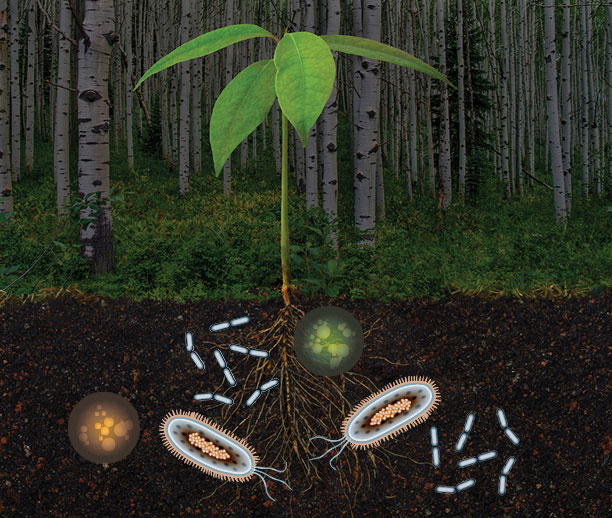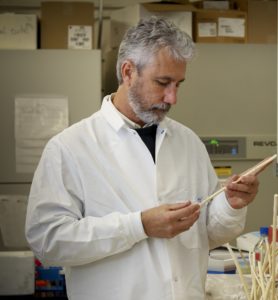0July 24–26, 2017, Walnut Creek, CA

The aim of this meeting is to bring together a diverse group of investigators interested in the role of secondary metabolites in plant-microbe and microbe-microbe interactions. The meeting’s goals include mediating an exchange of ideas and approaches for studying and manipulating the impact of secondary metabolites on environmental systems and to serve as an opportunity for the meeting participants to learn about JGI capabilities available to them.
Download the draft agenda here.
Speakers:
- Opening Keynote Speaker: Jo Handelsman, Wisconsin Institute for Discovery, “Convergence of model systems and the natural world”
- Closing Keynote Speaker: Gerald Tuskan, Oak Ridge National Lab, “Interkingdom signaling: a Populus case study”
- Ronnie de Jonge, Utrecht University, Netherlands, “(Understanding the Role of) the Root Microbiome and Plant Health”
- Alisa Huffaker, UC San Diego, “Understanding the role of specialized metabolic networks mediating biotic interactions in maize through integrated multidisciplinary approaches”
- Sophien Kamoun, The Sainsbury Laboratory, UK, “Membrane trafficking at the host-pathogen interface”
- Nancy Keller, University of Wisconsin Madison, “Omics Approaches to Deorphanize Fungal Natural Products”
- Jie Luo, Huazhong Agricultural University, China, “Dissection of Metabolic and Phenotypic Traits in Major Crops”
- David Mead, Varigen Biosciences, “Metagenomic and Synthetic Biology Approaches for Natural Product Discovery”
- Sarah O’Connor, John Innes Centre, UK, “Harnessing the Chemistry and Biology of Plant Metabolism”
- Caroline Roper, UC Riverside, “Plant associated biomes & effects on the environment”
- Gary Siuzdak, The Scripps Research Institute, “Cloud-Based Systems Biology guided by Metabolomics”
- Michael Smanski, University of Minnesota, “Redesigning the Genetics of Secondary Metabolism in Streptomyces”
- Eriko Takano, The University of Manchester, UK, “Harnessing Synthetic Biology for the Production of Fine and Specialty Chemicals”
- Yi Tang, UC Los Angeles, “Genome Mining for New Herbicide”
- Matthew Traxler, UC Berkeley, “Specialized metabolism in Root Nodule Communities”
- Gillian Turgeon, Cornell University, “Comparative Phylogenomics Identifies Fungal Secondary Metabolites Allied with Virulence to Plant Hosts”
- Wenjun Zhang, LBNL, “Discovery of Novel Signaling Secondary Metabolites from Clostridium”
- Huimin Zhao, University of Illinois at Urbana-Champaign, “Discovery and Engineering of Novel Natural Products via Synthetic Biology”
Jo Handelsman, Wisconsin Institute for Discovery
Dr. Jo Handelsman was appointed by former President Barack Obama as the Associate Director for Science at the White House Office of Science and Technology Policy (OSTP) where she served for three years until January 2017. She received her Ph. D. at the University of Wisconsin-Madison in Molecular Biology and has since authored over 100 papers, 30 editorials and 3 books. She is responsible for groundbreaking studies in microbial communication and work in the field of metagenomics. Notably, in 2011, she received the Presidential Award for Excellence in Science, Mathematics, and Engineering Mentoring from President Obama and in 2012, Nature named her one of “ten people who mattered this year” for her research on gender bias in science. Dr. Handelsman is the Director of the Wisconsin Institute for Discovery at the University of Wisconsin-Madison.
Dr. Tuskan is Group lead of the System Biology group at ORNL. He received his Ph.D. from Texas A&M in genetics and has authored over 190 papers. Dr. Tuskan headed the effort to sequence the first perennial plant, Populus trichocarpa or black cottonwood, the analysis of which was published as the cover article in the journal Science and has been cited over 2,000 times. Dr. Tuskan was named the Forest Biotechnologist of year in 2011. Over the past 8 years, Dr. Tuskan has co-led a project studying the molecular interactions between Populus and its microbial associates. This project has led to leading-edge understanding of molecular signaling related to small secreted proteins, bacterial quorum sensing, and secondary plant metabolism.
